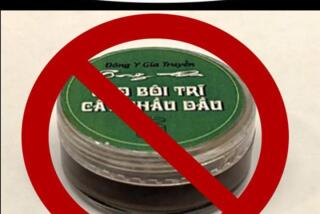Health : Study Finds Oils Cause Rapid Condom Failure
- Share via
A wide range of lubricants commonly used in conjunction with condoms--including Wesson oil, Nivea hand cream, Vaseline Intensive Care lotion and baby oil--can cause the contraceptives to break within 60 seconds after they are applied, far more quickly than researchers had believed, a new study has found.
And one of the principal investigators in the Los Angeles-based research contends that packaging directions for dozens of products ignore the potential damage that can be done to condoms or dismiss it in vaguely worded precautions.
The missing or misleading package warnings, asserted Bruce Voeller, president of the Mariposa Foundation sex research organization, may lead people to rely on lubricants that can cause nearly immediate condom failure, even though users mistakenly believe that the lubricants in question are water-based, and therefore safe.
The result, said Voeller and UCLA researcher Ann Coulson, is that, as shown in various studies, 50% to more than 90% of condom users may be relying on lubricants that will cause condom failure less than one minute after application. A survey of nearly 1,300 men, for instance, found that Vaseline Intensive Care lotion was used by 61% of the respondents. Baby oil was chosen by more than half of the men in a similar British study.
Of 25 men questioned extensively for the new study, Voeller said, 23 said they relied on Vaseline, Nivea or Johnson & Johnson’s baby oil--not knowing that all three products quickly cause condoms to break down.
Safe lubricants, Voeller said, include water-based preparations such as KY Jelly, as well as generic contraceptive gels that contain the spermicide nonoxynol-9.
The mistaken impressions about lubricants, Voeller said, are facilitated by the ease with which many oil-based products can be washed from the skin with soap and water. A report of the new research is in the current issue of the journal Contraception.
“Use of such oils poses clear danger to those employing condoms for contraception or the prevention of sexually transmitted diseases, including AIDS,” the researchers said. “This observation is of importance because of the increasing emphasis placed upon (the use of contraceptive gels as lubricants capable of fighting AIDS) in AIDS prevention recommendations, such as those of (Surgeon General C. Everett Koop).”
The observation about the quickness of condom failure in the presence of oil-based lubricants is the latest development in research that has recently shown that such products can be responsible for the breakdown of latex rubber in condoms during intercourse. Condom failure caused by lubricant damage, Voeller and other experts have warned within the last year, can expose people to high risks of infection with sexually transmitted diseases.
Voeller said latex condoms exposed to oil-based lubricants suffer “very, very rapid deterioration.” Some studies show that the majority of sexual encounters last an average of about two minutes--the breakdown of condoms is so quick that failure can occur even in such a brief moment of intimacy.
The research was based on studies of condom users who had experienced frequent breakage of prophylactics, as well as on laboratory tests in which condoms were coated with a variety of lubricants and inflated with nitrogen to test pressures at which they would burst.
Voeller said that the study confirmed that all products that contain mineral oil--including baby oil and regular Vaseline petroleum jelly--are equally harmful. But the study, Voeller said, also found that vegetable-based cooking oils--including Mazzola and Wesson oils, as well as olive oil, safflower oil, Crisco, butter and even extra virgin olive oil--are just as dangerous.




